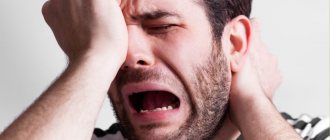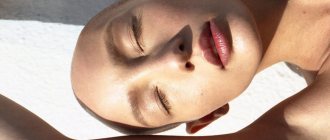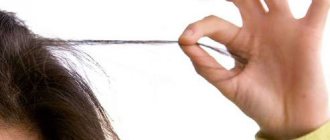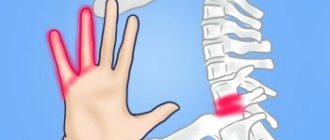Hello, dear readers!
The mood of any person largely depends on his external image and the internal state of the body. At the same time, any unusual sensations should make everyone wary. After all, for example, burning of the scalp and hair loss can signal dangerous diseases.
But there is no need to get upset here right away. Of course, such unpleasant symptoms can cause panic, especially in women. But only a competent specialist will help you find out why this happens. Therefore, it is better not to delay this issue and immediately go for a consultation with a doctor.
And I’ll tell you why burning of the scalp with manifestations of alopecia is an alarming sign. You will also find out what problems are behind this and how they can be resolved, knowing the specific reasons for the development of this pathology.
Physiology of alopecia associated with burning of the epidermis of the head
Typically, permanent hair loss occurs without any significant symptoms. However, if the process of baldness is accompanied by unpleasant feelings of itching, burning, pain, rash or flaking, then the cause lies in the scalp. After all, it is here in the zone of the deep dermis that tactile receptors are located, which are responsible for the sense of touch.
They can be affected by both external factors such as tight hairstyles, skin diseases or chemical burns after hair coloring, and internal factors. The most likely areas where the burning sensation is initially most felt and hair loss manifests itself are on:
- crown;
- Frontal region;
- Temples.
Other causes not related to illness
Sometimes itching and flaking of the scalp may not be associated with pathogens and internal diseases. Dry skin and flaking can result from:
- stress;
- vitamin deficiency;
- using incorrectly selected cosmetics;
- staining with permanent dyes;
- exposure to an aggressive environment;
- dehydration;
- metabolic disorders;
- poorly performed cosmetic procedures.
Since itching, flaking and redness of the scalp have many causes, it is worth consulting a doctor as soon as the problem arises.
The sooner a diagnosis is made, the easier it will be to eliminate unpleasant symptoms. It is useless to treat peeling on your own, because sometimes pharmaceuticals are needed, and in other cases it is enough to take vitamins. September 3, 2020
Author of the article: dermatologist Mak Vladimir Fedorovich
Why does pathology develop?
Experts believe that burning of the scalp with the further development of alopecia are a consequence of physiological, psychogenic or pathological aspects.
These sensations can manifest themselves in people of different genders or age categories. Most often they are concomitant symptoms of certain diseases.
But if the situation is left unattended and the underlying ailment is not treated, then you can get a bunch of serious complications and persistent alopecia. Therefore, let’s look at some of the causes of unpleasant sensations in the form of burning of the scalp.
Poor hair care
This is one of the possible causes of a burning sensation in the scalp. It may occur due to:
- Tight hairstyles, usually with various salon weaves such as afro braid or zizi.
- Hair styling with a hairdryer or curling iron after washing your hair.
- Hair coloring, where ammonia components are used as dyes, and hydrogen peroxide is used for bleaching.
- Women wearing hats or wigs that are inappropriate in size and fit tightly.
- Ignoring protection of your head from the sun, cold, snow or rain.
Wrong lifestyle
Usually, unpleasant pain symptoms, burning, itching of the skin on the crown or frontal area of the head are the result of serious overwork of the human body. The reason for this may be:
- Insufficient rest;
- Intense pace of the working day;
- Physical inactivity;
- Poor nutrition.
At the same time, bad habits such as smoking or alcohol abuse, a disorderly lifestyle worsen the functioning of a person’s vascular system, causing spasms of his small capillaries that feed the hair follicles or bulbs.
In addition, diseases such as atherosclerosis, vegetative-vascular dystonia or arterial hypertension can only increase discomfort.
And due to circulatory disorders and deterioration of metabolic processes, blood begins to accumulate in certain areas of the head, appearing on the skin:
- Burning;
- Hair loss;
- Painful sensations;
- Unpleasant itching.
Allergy
Typically, the nature of the sensation of pain and burning of the skin on the head with allergies is temporary and episodic. Since it is related to:
- The use of low-quality cosmetics such as shampoos, balms, hair care styling products.
- By consuming certain foods in your diet such as eggs, citrus fruits, chocolate or fish.
- Using certain medications.
- Hair coloring, after which the scalp may look like it is burned, accompanied by burning and itching.
And now, regarding the last judgment, I want to warn some women that before the next hair coloring and applying a new dye, you do not forget to do a wrist test in order to avoid negative consequences.
Diseases of the body
A burning sensation on the scalp and associated hair loss can be caused by:
- Hormonal imbalance in the body of women during menopause or pregnancy;
- Constant stress or nervous breakdowns;
- Malignant neoplasm in the head;
- Osteochondrosis of the cervical spine;
- High blood pressure;
- Dermatitis or staphylococcal lesions of the skin of the scalp.
Why do hair roots hurt?
I think many people, both men and women, have experienced this. Outwardly, everything seems to look great: good hair and you take care of it, as they say, according to all the rules, but sometimes scalp pain makes itself felt. Such exacerbations usually occur during transition periods - in spring and autumn, as well as after stress.
Why do hair roots hurt?
Are you familiar with this situation? From time to time you suffer from headaches, but this is not an ordinary pain. It feels like your scalp is hurting, as if at the roots of your hair.
I think many people, both men and women, have experienced this. Outwardly, everything seems to look great: good hair and you take care of it, as they say, according to all the rules, but sometimes scalp pain makes itself felt. Such exacerbations usually occur during transition periods - in spring and autumn, as well as after stress.
Why does the scalp hurt?
The most common cause is simple hypothermia of the head. Going outside without a hat, especially if your hair is wet, never goes unnoticed. Cooling the skin causes vasospasm. If the vessels under the skin are damaged, their narrowing causes pain, sometimes quite long and sharp.
In this case, a comprehensive examination by a trichologist and neurologist is necessary. You may be prescribed a course of treatment: injections, massage, vitamins. It is better not to let the pain continue and not endure it, but to consult a doctor immediately. It is necessary to cure the blood vessels from inflammation, and in the future, always go outside in cool weather with your head covered, even if you only ran out “for a minute.”
A common cause of scalp pain is simple stress. The body of each of us reacts differently to events in our lives. If you notice that your scalp begins to hurt after being very nervous at work, most likely the cause of the pain is stress. In this case, taking natural sedatives such as magnesium, motherwort, and B vitamins will help solve your problem.
Why does my scalp still hurt? Perhaps, when examined by a doctor, you were diagnosed with vegetative-vascular dystonia. In this case, the vessels of the whole body are very sensitive to any changes in both the external and internal environment of the body. Any stress, changes in magnetic background, sudden changes in weather conditions can trigger scalp pain.
Often pain and increased sensitivity of the scalp are the first harbinger of the onset of hair loss. In this case, especially if the hair loss has already begun, you should definitely go to the doctor. In addition to medical recommendations, it is worth supplementing treatment with masks and lotions for the scalp at home.
Another cause of soreness in the scalp is fungus. This does not happen very often, but the disease does occur. It is possible to pick up a fungus when using someone else's combs or hats. Therefore, observe the rules of personal hygiene and do not use other people's things.
Sometimes psoriasis can be the cause of pain. Psoriasis affects the entire skin, either entirely or in patches. And it may well settle under the hair. Moreover, this does not become noticeable immediately due to the hairline. But then the hair begins to thin and bald spots appear.
Pay attention to heredity. Sometimes it happens that weak hair follicles and thin sensitive skin are determined by hereditary characteristics, but this, of course, does not mean that treatment is useless. It is necessary to rub in medicinal products to strengthen the skin and hair. The scalp needs no less care than the skin of the face.
Allergic reactions
This is a very common cause of scalp pain. Some allergens, when affecting the body, manifest their effects in this particular place. However, more often the problem is an incorrectly selected shampoo (or another hair product; by the way, during and after coloring and perm you may feel a strong burning pain - this means that the product is not suitable for you, do not forget about the preliminary sensitivity test!).
Review your diet and consult a doctor to identify the source of this reaction, as well as take a set of measures to restore normal balance.
Women with long hair sometimes have scalp pain for a very simple reason - they pull their hair too tightly in a ponytail or bun. If long hair bothers you and you can’t constantly let it down, then choose the softest hair clips and elastic bands, and be sure to leave your hair down at night to give it a rest. Very heavy and thick hair, especially if it is very long, can also cause pain.
It is also possible that the reason is that you do the same hairstyle, styling, and when you comb your hair differently, the hair follicles begin to hurt. If your scalp hurts for this very reason, then the only way out is to massage the scalp.
It can be carried out either by a specialist or independently if you have certain skills. The massage can be simple manual or using special massagers - it doesn’t matter. The main thing is to regularly find time for this pleasant procedure. By the way, a good idea is to combine a massage with shampooing.
The water should be very warm to relieve spasm of the blood vessels in the head, and the shampoo should be mild so as not to irritate the sensitive scalp. Massage significantly improves blood circulation, so the pain will immediately recede into the background, and after several procedures it will disappear completely.
Whatever the reason for the soreness of the scalp, in general your skin can confidently be called sensitive, which means it requires more careful and gentle care. The first and most important recommendation would be to visit a doctor to identify the causes of your problem and select adequate treatment.
In general, it would be a good idea to regularly pamper your sensitive scalp with various masks, especially those based on oils, rubbing in special medicinal products, regular massage, as well as regular and timely cleansing of the scalp.
A balanced diet and the ability to cope with stress will also be helpful.
Health to you!
How to solve a problem?
Typically, dermatologists begin treatment of alopecia and the associated burning sensation of the scalp by studying the medical history, diagnosis, and the opinions of specialized specialists on this matter. Here they give the patient:
- Magnetic resonance imaging;
- Electroencephalogram;
- A council of specialists, which includes a therapist, an ophthalmologist, an osteopath, a neurologist, and a psychologist.
After processing the results of hardware and laboratory tests and studying the opinions of highly specialized specialists, the doctor determines an individual course of treatment for each person. Depending on the reasons for the development of the pathology, patients may be prescribed:
- Calming procedures;
- Taking antidepressants;
- Surgical removal of the tumor;
- Physical therapy classes;
- A course of antihistamines;
- Vitamin and mineral complexes;
- Aromatherapy;
- Self-massage with essential oils of mint, olive, basil or lavender;
- Special antifungal shampoos with antimicrobial components.
Well, that seems to be all I wanted to tell you. The main thing is that if a problem occurs, consult a doctor promptly. Stay calm. Take care of your nerves! Follow all doctor's instructions, and then your hair will always be in perfect condition!
Wishing you healthy hair and scalp! See you!
Pathological causes of flaking scalp
Peeling is often a symptom of the disease. Among the most common reasons:
- psoriasis;
- neurodermatitis;
- seborrheic dermatitis.
Psoriasis of the scalp is a chronic disease in which pink papules are formed, raised above the skin. A characteristic feature of such spots is scales on the surface. If you clean them off, droplets of blood will appear, like dew. Peeling in psoriasis is local in nature, small spots can merge into larger ones, but clean areas of skin still remain.
In this case, a special plant-based ointment will help remove peeling and itching, which will relieve inflammation and moisturize the skin. Peeling in psoriasis is the result of too rapid division of epithelial cells.
Neurodermatitis is often localized in the occipital region. The disease has a hereditary predisposition, its causes are still unknown. With this dermatological pathology, a person experiences severe itching and the skin begins to peel off.
Seborrheic dermatitis leads to dandruff. The causative agent is yeast-like fungi, which each of us normally has. But with increased sebum formation, fungi become more active and lead to disease. The scalp begins to itch, and dry white scales fall on the shoulders. In this case, special antifungal agents will help remove flaking of the scalp.
What can cause a burning sensation in the head?
There are several reasons for a burning sensation in the head; here are the main ones in order of prevalence (most common first):
- Disturbances in the psychological sphere and mental disorders. Panic attack, acute reactions to stress, neurosis, depression, endogenous diseases, organic mental disorders - with these diseases, overexcitation of the central nervous system can be observed and, as a result, SENESTOPATHIES can develop (more about senestopathies) in the form of a burning sensation in the head and other parts of the body . In these cases, a burning sensation in the head is accompanied by mental symptoms: anxiety (fear, panic, horror), sleep disorders (insomnia, early awakenings, drowsiness), autonomic disorders: surges in blood pressure, pulse, heartbeat, trembling, etc.
- Neurological diseases. Increased intracranial pressure with impaired outflow of intracerebral fluid. Damage to brain tissue due to neoplasms (cysts, neoplasms), atrophy of nerve cells. Deterioration of blood supply to the brain with osteochondrosis of the cervical spine, anomalies of the blood vessels of the spine. Consequences of skull and neck injuries. Multiple sclerosis. Vegeto - vascular dystonia (neurocirculatory dystonia). With a neurological origin of a burning head, signs of disorders in the nervous system are observed in the form of pathological reflexes, asymmetry of normal reflexes, changes in muscle tone and sensitivity.
- Vascular pathology. Hypertension with crises. Vascular atherosclerosis. Cerebral blood flow disorders due to strokes and heart attacks.
- Overwork. The main feature in this case will be that after proper rest, all painful symptoms will pass without a trace.
- Fever. An increase in temperature, regardless of the cause (infection, inflammation, injury), may be accompanied by a burning sensation in various parts of the body.
What to do if you have a burning sensation in your head
The first thing is to find and eliminate the cause. If this symptom persists, you should consult a doctor. In severe cases, you need to call a doctor at home. The doctor will be able to assess the condition and prescribe treatment, if necessary.
You can take some measures on your own that can alleviate the condition: rest, isolation from external irritants, water procedures (contrast shower). In some cases, physical activity in the form of strength exercises (push-ups, squats, etc.) can help.
As stated above, the most common causes of a burning sensation in the head are mental disorders and neurological diseases. If you experience this symptom, you should consult a psychiatrist or neurologist.










